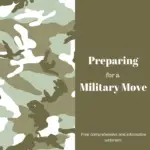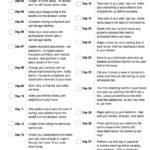
Military moves can be stressful. By planning ahead and being proactive about logistics, relocation should go as smoothly as possible.
As soon as your orders have arrived, begin planning. Contacting your new base’s sponsorship office and personal property office for entitlements, contacts and any resources that may help facilitate an easier relocation.
Make a List of Your Belongings
If you have the option of hiring a military moving company for your move, visit your installation’s transportation office as early as possible to secure dates that fit with what you want for packing and delivery. This step may be particularly crucial during PCS season when finding packing/delivery dates can be more challenging.
Start a home inventory and organize all of the items needed for your move. For instance, hobby items and books scattered throughout your house should be collected together so they can all be packed into one box for easier unpacking. This will make finding what you need easier.
As part of your move to your next duty station, now is an opportune time to donate any unnecessary or no longer wanted items, as well as organise a garage sale with military friends or community for an enjoyable way to say farewell.
Create a Moving Binder
Maintaining an organized moving schedule and to-do list requires keeping a binder with tabbed dividers and page protectors at hand, notes Megan from The Homes I Have Made. A moving binder could also serve as a handy way of corralling papers and receipts that have accumulated across your house before moving day – so consider creating separate sections in it, like contacts, specifications, loan documents etc, notes Megan.
Create a folder for any important documents, such as copies of orders for your service member or an inventory list for their household goods, which could prove essential when moving overseas with military.
At this stage, it would also be prudent to go through your belongings and purge those which you no longer use or plan on needing soon. Consider donating items to charity or hosting a yard sale depending on your preference; military Professional Gear should also be set aside so it won’t count against your weight allowance and save money by packing less for your move! The fewer boxes you pack means greater savings!
Make a Budget
Military moves can be costly. To avoid overspending on your move, create a budget and begin saving as soon as possible.
Arguably the best thing you can do for your move is save some funds in case any damages or losses occur during transport. Unfortunately, damaged items will often not receive full reimbursement, but there is a process available which could help get what is owed back to you.
One key part of making a budget is paying all outstanding bills on time, as any outstanding debt may incur late fees and additional interest that will eat into your budget during a move. Review bank statements and credit cards to get an accurate estimation of fixed expenses like rent, utilities, food, transportation. You should also consider adding in any extras such as extra movers, hotel stays, or meals on the road.
Organize Your Packing
Relocating is never an easy experience, and when it involves military moving it can become even more complex. Military families typically relocate every 2-3 years so keeping organized throughout the process is essential to making a smooth transition.
As soon as you are able to, start purging items that you no longer use or need early on in your PCS planning process. Not only will this reduce the amount of stuff that needs to be packed, but it will also save money and time during the move itself.
As soon as you receive orders and know your dates, secure housing as soon as possible. Doing this can help prevent potential complications later during peak moving season when rates are higher, roads are congested and many military movers are already booked up. In addition, planning ahead allows for additional expenses like more costly gas stops or packing supplies.





